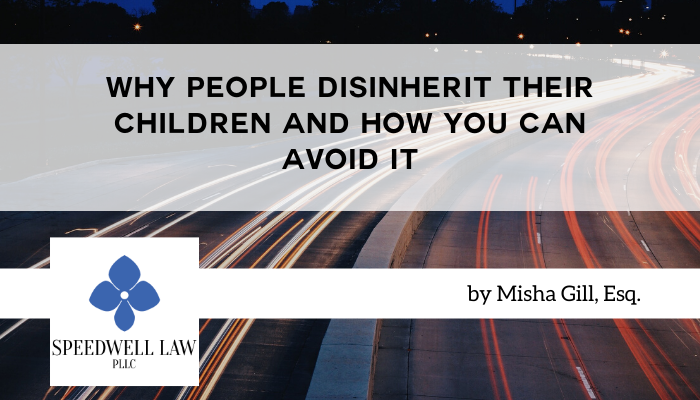
Why People Disinherit Their Children and How You Can Avoid It
Done properly, an estate plan will usually do what you intend it to do. Make too many mistakes, however, and your family could be facing a lot of unintended consequences.
Here are the top reasons why people accidentally disinherit their children:
Estate Planning Documents Not Up-to-Date
Life can be unpredictable. You must therefore update your estate plan every three to five years. Furthermore, your estate planning documents should be updated whenever you experience one of the following life events:
- You move to another state;
- You get married;
- You get divorced;
- You adopt a child;
- You start a business;
- You have a significant change in assets; and
- You lose a loved one
For example, if you get married again but fail to update your estate planning documents, you may accidentally disinherit children since all of your assets may then go to your new spouse and not your children.
No Instructions Left for Distributing Personal Property
While money can easily be split between multiple individuals, personal property cannot. If you want to leave a legacy with your personal property, you should do so by gifting these items to your loved ones during your lifetime, or by attaching a memorandum to your will that explains who should receive which items from your estate.
If you believe that a particular item is more likely to be fought over, your memorandum should include specific instructions regarding the distribution of that item and perhaps an explanation. The instructions you leave in your memorandum will be legally enforceable.
Blended Families
Estate planning is more complicated for blended families, stepchildren, and after remarriages and divorces. So, when creating your estate plan, you must make sure that your estate planning attorney is fully aware of your familial circumstances to avoid accidentally disinheriting anyone.
Assets Are Not Owned Properly
There can be unintended consequences if the way you own your assets is not in alignment with your estate planning goals. For example, to distribute your estate via a trust, you must make sure that all of your assets are owned by your trust. In other words, your assets must be titled in the name of your trust. Likewise, if you want your assets to be distributed through your will, you must own them outright in your own name.
Most people choose to own large assets, such as their family home, jointly with their spouse. This is because when either spouse passes away, the surviving spouse automatically inherits the asset outright, without the need for probate.
Joint ownership works just fine for traditional first marriages and non-blended families, but what if:
- You are in a second marriage and each of you wants to leave your individual assets to your own children from previous relationships?
- Your surviving spouse remarries and gives money to their new spouse for a business venture? This money will be given from assets that should eventually go to your children.
- Your surviving spouse is sued for malpractice, files for bankruptcy, or remarries and ends up getting divorced?
Each of these scenarios could drain all the assets inherited from you by your spouse via joint ownership, leaving nothing for your children to inherit. Good estate plans use methods other than joint ownership to protect assets and ensure that loved ones are not accidentally disinherited.
Contact an Experienced Virginia Estate Planning Attorney
For more information on what you can do to avoid accidentally disinheriting your children in Virginia, and for the help you need, contact our law firm at (703) 553-2577 or use the contact form on our website to arrange a consultation with an experienced Virginia estate planning attorney.
The information on this site is for general informational purposes only. The information presented in this site is not legal advice or a legal opinion. You should seek the advice of legal counsel of your choice before acting upon any of the information in this site.





